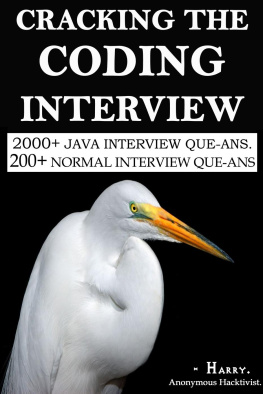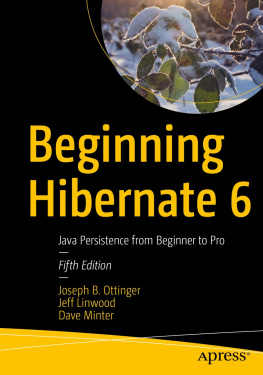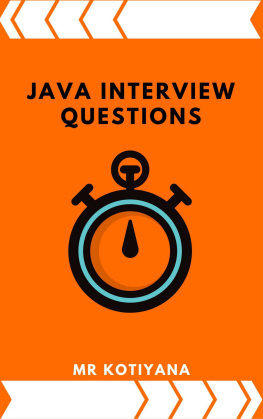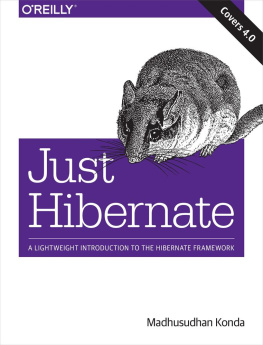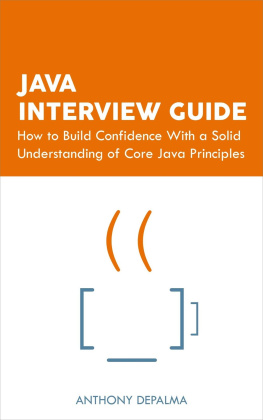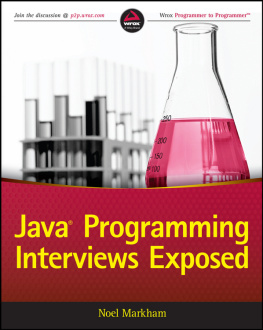Grokking The Java Developer Interview
More Than 200 Questions To Crack The Java, Spring, SpringBoot
& Hibernate Interview
JATIN ARORA
GROKKING THE JAVA DEVELOPER INTERVIEW
COPYRIGHT 2020 BY JATIN ARORA.
All rights reserved. No part of this book may be reproduced, distributed, or transmitted in any form or by any means, including photocopying, recording or other electronic or mechanical methods, without the prior written permission of the author, except in the case of brief quotations embodied in critical reviews and certain other non-commercial uses permitted by copyright law.
For permission or any other information, contact me at:
Preface
Grokking The Java Developer Interview helps you to crack a Java, Spring & Hibernate interview.
This book covers enough details of a Java/Spring topic that will surely help the absolute beginners and if you are already familiar with Java & Spring, then this book will help you to brush-up on the concepts.
The book has more than 200 questions that are frequently asked during an interview for Java, Spring, SpringBoot & Hibernate profile. Some of the important topics like Multi-threading, Collection framework, Singleton Pattern, SpringBoot Annotations and many more are covered in detail. Most of these topics are explained with code examples that will help you to quickly grasp the concept.
Who is this book for?
This book is for you if you are either preparing for an interview, planning to move into this field in future, brushing up your Java & Spring skills or just want to get an in-depth overview of the field. This book provides the most important and frequently asked questions along with their solutions.
Who is this book NOT for?
This book is not for you if you are looking for an in-depth study of Java or Spring. The objective of this book is not to discuss the ongoing research or challenges in this industry or serve as a substitute for a course book.
If you follow this book diligently, you would be better equipped to face any Java interview. Whether you are a beginner or an intermediate level expert in Java, this book has enough juice for you.
This book contains a lot of code examples, most of the code snippets are displayed in image format that you can zoom-in and out of. However, if some image is not clearly visible on your device, you can also refer to the GitHub repository for this book. The GitHub repo contains all of the snippets shown in this book and it can be found at:
https://github.com/reachjatin/Grokking-The-Java-Developer-Interview
Contact Information
I would love to hear from you.
For feedback or queries, you can contact me at
Your valuable suggestions to improve the book are always welcomed.
I wish you all the best and I am confident that this book will help you in making that job switch that you are looking for.
Happy Learning, Cheers :)
-Jatin Arora
Acknowledgements
I thank my brother, Sumit Kumar, for encouraging me to take up this project. From reading early drafts to advising me on the structure of the book to making sure that it was written in a manner that was coherent, organized and engaging at the same time, his role has been pivotal in the making of this book.
To elaborate a little on his background, Sumit is an UChicago Alum, and presently working for Amazon, Seattle as a Research Scientist at Alexa AI. He has also worked with Samsung, India as a Lead Engineer. He is an active blogger and regularly post articles on Data structures and Algorithms, System Design, NLP and many more interesting topics. You can find those at:
https://medium.com/@sumit.arora
https://blog.reachsumit.com
To Sumit, for his patience in reading through various preliminary versions of this book, and his vital suggestions. Thank you brother for never saying no to my numerous feedback requests and providing all the constructive criticism. I dedicate this book to him.
I would like to express my sincere gratitude to my family, friends, and everyone who motivated me throughout. Thanks for the support, the honest feedback, and for everything else that has helped to make this book possible in its current form.
-Jatin Arora
Table of Content s
Question 1: What are the 4 pillars of OOPS?
Answer: 4 pillars of OOPS are:
- Abstraction
- Encapsulation
- Inheritance
- Polymorphism
Lets take a look at them:
- Abstraction : Abstraction is a process of hiding the implementation details and showing only functionality to the user.
Real world examples:
- | TV remote: To start the TV, you have to press the power button, you dont have to know about the internal circuit operations like how infrared waves are passing. |
- | Car gears: We know what happens when we change the gear. But we dont know how changing gear works under the hood, that information is irrelevant to us, so it is abstracted. |
In java, Abstraction can be achieved in two ways:
- | Abstract classes |
- | Interfaces |
- Encapsulation : Encapsulation is a process of Binding data and methods within a class . Think of it like showing the essential details of a class by using the access control modifiers ( public, private, protected ). So, we can say that Encapsulation leads to the desired level of Abstraction.
Example:
Java Bean, where all data members are made private and you define certain public methods to the outside world to access them.
- Inheritance : Using inheritance means defining a parent-child relationship between classes, by doing so, you can reuse the code that is already defined in the parent class. Code reusability is the biggest advantage of Inheritance.
Java does not allow multiple inheritance through classes but it allows it through interfaces.
- Polymorphism : Poly means many and Morph means forms. Polymorphism is the process in which an object or function takes different forms. There are 2 types of Polymorphism :
- | Compile Time Polymorphism (Method Overloading) |
- | Run Time Polymorphism (Method Overriding) |
In Method overloading, two or more methods in one class have the same method name but different arguments. It is called as Compile time polymorphism because it is decided at compile time which overloaded method will be called.
Overriding means when we have two methods with same name and same parameters in parent and child class. Through overriding, child class can provide specific implementation for the method which is already defined in the parent class.
Question 2: What is an abstract class?
Answer: A class that is declared using abstract keyword is known as abstract class. It can have abstract methods (methods without body) as well as concrete methods (methods with body).
Some points to remember:
- | An abstract class cannot be instantiated, which means you are not allowed to create an object of the abstract class. This also means, an abstract class has no use unless it is extended by some other class |
- | If there is any abstract method in a class then that class must be declared abstract |
- |




